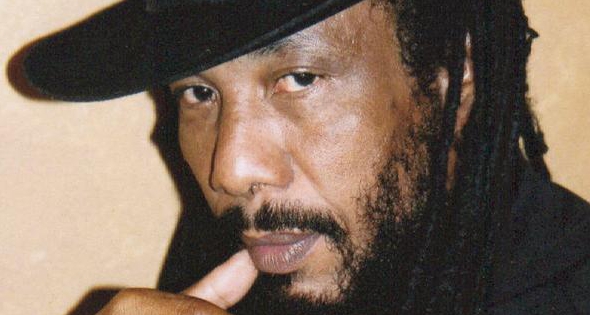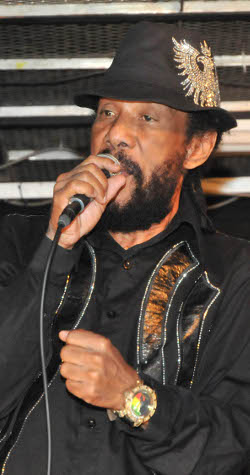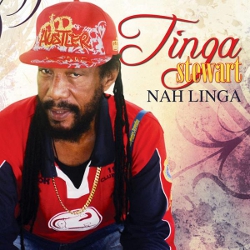Articles about reggae music, reviews, interviews, reports and more...
Interview: Tinga Stewart
- Home
- Articles
- Interviews
- Interview: Tinga Stewart

Interview: Tinga Stewart
"Mr Boris Gardner was a perfectionist. I sang a little off key - he took the bass and conked me on my head!"
Sampler
Neville "Tinga" Stewart was born in East Kingston and grew up around the Kingston 11 Waltham Park Road area. He and his younger brother Roman Stewart both showed an aptitude for singing, with Roman cutting his first side in 1967 and Tinga following him in 1968. But it was on the hotel and club circuit that Tinga really made his mark, performing a wide variety of Jamaican and foreign popular music with the Boris Gardner Happening that would inform the soulful love songs of his recorded works. A solo career beckoned when he won the 1974 Jamaica Independence Festival popular song contest with Play The Music, which reached a high point when he took the 1981 contest with the classic Nuh Weh Nuh Better Than Yard. Roman and then Tinga relocated to New York and continued to be active in the dancehall era until, sadly, Roman passed away due to heart problems in 2004 after a concert by his old friend Freddie McGregor. But Tinga has carried on the family legacy and in 2009 released his latest album 'Nah Linga', co-produced by his son, taking more of a roots direction than the lovers staples for which he is known. He has a new single Victim produced by Patrick Booth of Sollueshing Productions due in mid January 2012. Angus Taylor spoke to Tinga about his "love of love", American soul music and how he has remained current through the years...

Who got into music first, you or your brother?
My brother recorded before me but I was involved in it first. He recorded in '67. The Tenors group produced a song with him Walking Down The Street on the other side of a tune called Ride Me Donkey. Me, I was always singing in bands. My first band was called Wildcats band and we used to sing a lot in clubs. Then I moved on to the Boris Gardner Happening from 1971-74.
What was your first tune?
My first tune was with Ernest Wilson and the Clarendonians - a song called She's Gone in duet and that same night I did a song called Hear That Train. We went down to Dynamic Sounds studio, Byron Lee's studio, and there were musicians like Esmond Jarrett on drums, Hux Brown on guitar, Jackie Jackson on bass, Gladdy Anderson on piano, Winston Wright on keyboards - musicians like those. It was great we recorded two tracks and just had to sing everything one time. It was produced by Derrick Harriott.
Both you and brother sang for Derrick Harriott, right?
Yes, he did a song for Derrick that was written for Dennis Brown - Now That The Change Has Come [Changing Times]. That's why people always say Dennis followed Roman's style because they were close friends for a time. And when Roman sang "NOW THAT THE CHANGE HAS COME... WE MUST HAVE SOME FUN..." in that big style that a lot of artists have tried to imitate - no one imitated him like Dennis Brown.
 Roman sang in that big style that a lot of artists have tried to imitate - no one imitated him like Dennis Brown
Roman sang in that big style that a lot of artists have tried to imitate - no one imitated him like Dennis Brown
What was Derrick like to work with?
At the time Derrick was a very cool producer, a singer producer, so good to work with. In those times we had The Chosen Few there alongside myself because they did the background vocals to my first song Hear That Train. They backed my songs with their harmonies. He also had people like the Kingstonians, Eric Donaldson passed through, Rudy Mills, and Scotty did his solo thing to make a name for himself away from the Chosen Few, Big Youth, and Keith & Tex who sang Stop That Train. All those people were around Derrick.
You were quite active on the hotel and club circuit in your early days – what are your memories of those days?
Great memories. People dancing, singing to people. We'd play American pop songs, calypso songs and a wide repertoire of soul songs. I learned to sing all those songs with Boris Gardner. I remember one time I was singing this song and people were dancing and I sang the song a little off key - he took the bass and conked me on my head! To make me aware that I was flat. That made me aware of what I was doing and try to sing better. Mr Boris Gardner was a perfectionist. I should say I went to a university working with Boris for three to four years and it was a great experience.
You've sung and interpreted many American soul and R&B songs in your solo career. Was it that period that gave you that versatility - singing all those styles of music?
That's correct. That was the nurturing for me singing all those songs that came from the Boris Gardner tutelage and the experience working with him made me come out with all those songs you're talking about.
How did you depart from Boris Gardner to go solo and be replaced by Earl 16?
I really didn't leave. It was 1974 and Ernie Smith wrote this song for me called Play The Music and it won the Festival Song while I was with Boris Gardner so I started getting solo work all around the country and Boris hired Earl 16. He took my position as vocalist with the band but I wasn't fired or anything like that. I just moved on and it was cool runnings with everything.
You sang the winning festival song of 1974 and wrote the winning song of 1975 – when Roman won the next year.
 Yes, I wrote that one in 1975 - a song called Hooray Festival - and decided not to enter with the song. What really happened was in the finals they didn't pick the song. But Toots and the Maytals dropped out of the competition because they had to go on tour. So because that song made an impact on that night they called back for that song. Toots dropped out of the final six and Roman won it with that song.
Yes, I wrote that one in 1975 - a song called Hooray Festival - and decided not to enter with the song. What really happened was in the finals they didn't pick the song. But Toots and the Maytals dropped out of the competition because they had to go on tour. So because that song made an impact on that night they called back for that song. Toots dropped out of the final six and Roman won it with that song.
Was there ever a rivalry between you and your brother – as two professional and successful singers?
Never. We did two albums together - one called Brother to Brother and one called Break Down The Barriers - and we always had a good vibes. At no time did we ever quarrel over singing. He'd leave New York for Jamaica and make the rhythm tracks, bring them back to New York and we'd voice them together. That was how we'd do it because he left Jamaica in 1976 and didn't come back.
As we said, you covered a lot of soul tunes like Why Can't We Live Together, Rainy Night In Georgia; Al Green, The Drifters – what is it you love about those great American artists and songs so much?
You see, I love love. Those songs are expressing a lot of love. I love singing to women. I like to sing those balladeering love songs because you can soothe the world with love. I like to sing culture songs too but when I tour there are a lot of love songs.
Who are your favourite US singers and why do you like them?
Al Green, Marvin Gaye. When I was singing with Boris Gardner band I always wanted to sing songs like Let's Get It On and I just loved the styling of Al Green and Marvin Gaye.
 I like to sing those balladeering love songs because you can soothe the world with love
I like to sing those balladeering love songs because you can soothe the world with love
A lot of younger people in the UK and Europe know you for your 1977 cover of Timmy Thomas' Why Can’t We Live Together on the Blood & Fire Darker Than Blue compilation.
That was for Ronnie Virgo, who laid the rhythm tracks with Sly & Robbie. Ronnie told me he had the rhythm and he wanted me to do Why Can't We Live Together so we went into Channel One studio and the background voice on it was Brent Dowe. It was big outside of Jamaica because it didn't get any play here or get a big boost here. It just came out in Europe.
But the tune that most people in Jamaica know you for is Nuh Weh Nuh Better Than Yard which again was the Festival song of 1981 – tell me the story behind that song.
That was when Bob Marley was sick in Germany. Everyone was in mourning in Tuff Gong Studios. Then Sangie Davis said he had this song for me and started playing it on the guitar and it sounded very melodious to me and we wanted to enter it in the Festival. At the time we saw Rita Marley coming through the gates and played her the song and she said she wanted to produce it. The next day we went into the studio with the Wailers band and cut the track - and the rest is history!
You and Roman both feature on the concert DVD Vintage Reggae Bash Brooklyn 1983 at the Empire Roller Skating Center in Brooklyn with Big Youth, Leroy Sibbles, Ken Boothe, Delroy Wilson, Tinga Stewart, Roman Stewart, The Blues Busters. How did that happen?
I was in New York and the brother who was putting that festival show on was a good friend of mine so he asked me and Roman to do the show. I did a couple of songs on that show and they only put one on the video but it was a good show.
Why did you decide to leave Jamaica and follow Roman to New York?
I got a green card. I went over there for a while and after a couple of years I got a green card in about 1986. But I was still going back and forth to Jamaica. Then after a while I decided to get citizenship so I had to stay there for a little while, for a few years.
In the late 1980s and early 90s as the dancehall thing happened you carried on: covering American classics in deejay combination like Take Time To Know Her, Save The Last Dance with Ninja Man and Up On The Roof with Tiger for Steely & Clevie.
The first time the combination happened with Ninja Man I went by Jimmy Cliff's studio in Jamaica and saw Ninjaman. Every time he saw me he said he wanted to do a song and we heard this rhythm playing and Witty the producer was in the studio so we just went in front of the mic, Ninja Man was in front of me and I just sang it in one take and the song was finished. They told Ninjaman where to come back in and I sang the intro, he came in and I came in and that was it. One take. That was the first one, Take Him To Know Her. The second one came when Pickout the producer gave me some rhythm tracks. I went into the studio with him and was singing on this track and thought, "You know what? I'm going to give Ninjaman a second combination tune". So I went down Edison Avenue where he lived on my bike and said, "Ninja! I got a song for you man! A combination we can do down Channel One!" I said, "The song is called Cover Me" and he just looked at me and said, "Under Mi Love!" So we just jumped on my bike back to Maxfield Avenue and we did two takes - the engineer was Souljie - and it was history again!
 Roman was the king of specials in New York. Any time an artist came through New York they would have to find Roman
Roman was the king of specials in New York. Any time an artist came through New York they would have to find Roman
How have you coped with your brother’s passing in 2004 and what's your favourite memory of him?
My favourite memory of Roman? Oh gosh. So many memories. I remember Roman as the king of specials in New York. Any time an artist would come from Jamaica or any artist in the world came through New York they would have find Roman. You name any artist and they would tell you. If they came to New York it was Roman they had to find because he had the connections to do dubplates. He'd says, "Brother, I have some work for you" and we'd go to the studio. Everybody is the business: Ken Boothe, Alton Ellis...
Finally you came with a new album in 2009 called Nah Linga featuring a very cultural song Hail The King on the drum song rhythm with Ras Myrhdak.
 Well, the name of the album came about because my name is Tinga so I said "Nah Linga - that's what the name of the album is going to be". The engineering is by Mixing Finga who works with Capleton. We got together and mixed all the songs. One of the tracks is produced by Willie Lindo called Believe Me but most of the songs are produced by myself and Mixing Finga. There is a lot of cultural content on there. As well as Hail The King there is Praise Him, which is about respecting your parents and culture and not being a hypocrite, written by Willie Lindo. People often say to me, "Tinga! You sing too much love tune! Cho! Why you don't do some culture tune for Europe and them people!" So I decided to do some cultural content because people long to hear the culture side of Tinga.
Well, the name of the album came about because my name is Tinga so I said "Nah Linga - that's what the name of the album is going to be". The engineering is by Mixing Finga who works with Capleton. We got together and mixed all the songs. One of the tracks is produced by Willie Lindo called Believe Me but most of the songs are produced by myself and Mixing Finga. There is a lot of cultural content on there. As well as Hail The King there is Praise Him, which is about respecting your parents and culture and not being a hypocrite, written by Willie Lindo. People often say to me, "Tinga! You sing too much love tune! Cho! Why you don't do some culture tune for Europe and them people!" So I decided to do some cultural content because people long to hear the culture side of Tinga.
 People often say to me, "Tinga! You sing too much love tune! Cho! Why you don't do some culture tune for Europe and them people!"
People often say to me, "Tinga! You sing too much love tune! Cho! Why you don't do some culture tune for Europe and them people!"
You have a new single, Victim, out for 2012. What does the future hold for you?
Good things. Touring - can't stop! - and the album is picking up very well on iTunes, the internet and all that. People like it and they are buying it. So I'll keep on singing and performing - that's what I love best. So for 2012 I'm still recording new songs and I'm still going.
Comments actually desactivated due to too much spams
Browse by categories
Recommended Articles
Latest articles
Recently addedView all
© 2007-2026 United Reggae. All Rights Reserved. Reproduction in whole or in part is prohibited. Read about copyright
Terms of use | About us | Contact us | Authors | Newsletter | A-Z














